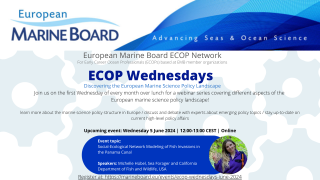
In this edition of the ECOP Wednesdays event series, hosted by the EMB Young Ambassadors and the EMB Secretariat for the EMB ECOP network, Michelle Hübel spoke about "Social-Ecological Network Modeling of Fish Invasions in the Panama Canal".
Species introductions have spiked over the past two centuries due to globalization. Aside from the impact that such introductions have on ecosystems, they also have long-term implications for human communities. In the Panama Canal, one of the world’s bustling hubs for global shipping, a recent canal expansion has coincided with a marked increase in marine fish species invading the freshwater portion of the canal (i.e. Lake Gatun). These invasions can impact the lake’s fishers who depend on that ecosystem for their livelihoods. In this context, social-ecological network (SEN) modeling can be a powerful tool to understand the combined impacts of introductions on ecosystems and societies. This study, using information from interviews with key stakeholders and available ecological data, constructs two SENs to characterize how both the aquatic ecosystem and the fishing communities of the canal have changed after the expansion and the subsequent rise in marine fish species incursions. We found that the post-expansion network was less connected with a lower diversity of income sources for fishers, making the network likely to be less resilient than before. Local fishers widely reported sharp increases in populations of marine species coinciding with a decline in their catch of historically targeted species such as Peacock Bass, and many attributed this to those marine species predating on Peacock Bass, Tilapia, and native freshwater fish species. Network indices revealed differences in diversity of species targeted between fishing communities, and thus variable susceptibility to economic impacts from ecosystem changes as a result of marine fish entry. Only a few previous studies have applied a SEN approach to aquatic invasions. This work thus contributes to a small but important body of literature on studying bioinvasions from a social-ecological perspective.

Michelle is an early career professional in marine ecology, fisheries science, and seafood sustainability. She recently completed an MSc. in Biological Oceanography from GEOMAR Centre for Ocean Research in Kiel, Germany, and has been involved in various projects related to linking social systems with fisheries ecology. She worked on social-ecological network modeling for Mediterranean fisheries with the Center for Ocean and Society, as well as on the establishment of traceability tools within the Portuguese octopus fishery with the Sea2See project. Michelle now works for Sea Forager, a supplier of locally- and sustainably-sourced seafood in northern California. She also works for the California Department of Fish and Wildlife, conducting field sampling for fisheries monitoring and stock assessment. Michelle is currently based in the San Francisco Bay Area, and splits her time between California and Portugal.
You can rewatch the presentation here.
For any questions, please send an email to info@marineboard.eu.